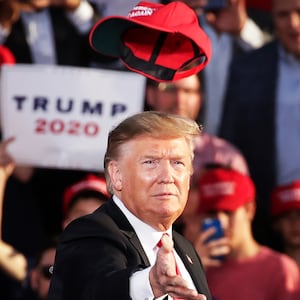In 1984, Ronald Reagan’s reelection campaign suggested it was “Morning Again in America.” Without getting in the muck, Reagan sailed to victory, losing only Walter Mondale’s home state of Minnesota. Donald Trump’s reelection kickoff message was slightly less positive.
On one hand, he wants to “Keep America Great”—a fine line that appears to be his new slogan. That’s optimistic, and Trump can (and did) cite a strong economy and tax cuts to plausibly buttress the slogan. On the other hand, Trump’s message on the night of his reelection kickoff was coupled with a secondary theme that occupied just as much of his time and attention: Democrats, he said, “want to destroy you.”
They’re not alone. Trump’s enemies in the “fake media” are also pushing of "hoaxes" and "witch hunts."
Rarely will you see a politician whose speeches go to such extremes of optimism and cynicism. The highs are high. The lows are low.
“Four more years!” read the placards in the packed arena. “USA!” “USA!” the crowd cheered. Trump started off ebullient, only to turn angry. And the energy switched from excitement to incitement.
It was no “American carnage” speech, to be sure, but anyone who watched this rally knows full well that this president will not seek to run a Rose Garden reelection campaign.
Trump personalized matters, too, suggesting that it was his audience (not Trump himself), who are the real targets of his enemies. “They tried to erase your vote,” he told the audience. (Conversely, he assured them that “my only special interest is you.”)
Why does he do this? Psychologically, it’s not enough to love Trump—you’ve also got to hate and fear his enemies. It’s not enough for Trump to receive adulation, he can’t just be doing well—he has to be thriving while simultaneously overcoming the most vicious opposition any president has ever faced.
But this is also consistent with a candidate who is a fighter—who never lets up—who always punches back twice as hard.
Will it work?
First, let’s admit there’s a method to the madness. Let’s start with why Donald Trump chose the Sunshine State to formally kick off his 2020 campaign. “The path back to the White House for the president runs through Florida,” Brad Harold, who managed Ron DeSantis’ gubernatorial campaign, told me a while back. He’s right. No president since 1960 has been elected without Florida (save for Bill Clinton in 1992).
The good news for Trump is that he has a good shot at winning the state. The state’s governor and both senators are now Republicans, the northern part of the state votes like the Deep South, and—whereas demographic changes tend to favor Democrats, a steady influx of old, white retirees from places like New York seeking golf and sunshine has made Florida more Republican. (Florida is Donald Trump’s “second home,” after all.)
What is more, Trump can perform well with Florida’s Hispanic vote. Although the sizable Puerto Rican population poses a challenge for him, Trump will likely do well with Cuban-Americans (in 2016, Cuban-Americans were twice as likely to vote for Trump as other Latinos) and Venezuelans—more than 200,000 of whom have settled in south Florida since 2014. For these voters, the more Trump can say “America will never be a socialist country,” the better. (Ironically, in almost the same breath, Trump promised to protect Social Security.)
There’s also a method to the madness with his speech.
Like a song that reaches a crescendo, Trump’s oratory finds ways to excite the crowd and keep them on edge.
It’s a tried and true formula that helped fuel Trump’s narrow victory in 2016, and sustained his high levels of support among Republicans (even as he lost the popular vote and his overall approval ratings have hovered in the 40s).
Why settle for merely giving voters a positive reason to support you when you can couple that with a negative reason for them to oppose your enemies? Why settle for mere excitement and joy when you can couple that with hatred and fear for the other side?
Ultimately, this rally became an excuse for Trump to recount a hodgepodge list of greatest hits and well-worn tropes, ranging from recognizing Jerusalem as the capital of Israel to “recognizing the right to keep and bear arms” to more “Made in the USA” products to school choice to launching a Space Force.
I’m not sure there was much new news, except maybe the “Keep America Great” slogan, which as I said seems to be the new slogan, based on a vote Trump conducted during his speech. The fact that posters bearing the slogan were already in the audience was just a coincidence, I guess.
Four more years? Be still my heart. I’m not sure how much more we can take. How much more vitriol. How many more hour-and-a-half speeches? But here we are.
A confident president might feel comfortable relying on his popularity and accomplishments to carry him through to reelection. Not Trump, whose rationale requires a two-pronged sensory assault. Just 503 more days to go in this love-hate relationship we call a presidential campaign.







